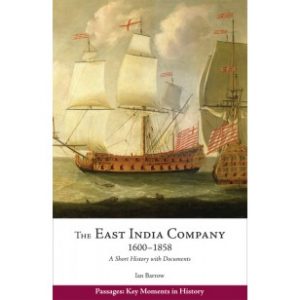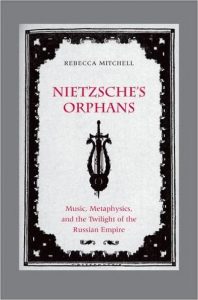
By Taylor Rossini
This past week, I interviewed Professor Ian Barrow about his 2017 book The East India Company, 1600-1858: A Short History with Documents. As a student in Professor Barrow’s East India Company course this fall, I had the opportunity to read the text, a succinct and elegant work about the rise and fall of a trading-company-turned-imperial-enterprise.
The East India Company emerged from Professor Barrow’s course of the same name, which he had taught for several years preceding the conception of the book. Disappointed by the lack of affordable, available texts geared toward an undergraduate audience, Professor Barrow took it upon himself to write such a book. He explained, “I wanted something that I could use in my own class that I think would be useful for other professors teaching on similar subjects—South Asian history, imperial history, even of course on the East India Company, whether historians, economists, anthropologists, or political scientists.” Students played an essential role in the formation of The East India Company. Professor Barrow noted, “One of the great benefits of coming to a liberal arts college, more so I think than going to a university, is that there’s a close connection between what professors research and write about and what they teach. This is an example of how I wanted to improve my course, and therefore went to an extreme by writing a book; but I think it’s part of a pattern that you see over and over again in every department—that professors are using their research to teach better and using their teaching to improve their research and scholarship. It’s one of the things that makes coming to Middlebury in particular distinctive, rewarding from professors’ point of view, but also productive from the students’ perspective.” Professor Barrow identified this book among his proudest achievements as a scholar: “I think that’s the best piece that I’ve written, and it’s taken a long time to get there. It’s taken four years of undergraduate study, it’s taken eight years of graduate school, and then eighteen years of teaching and being a historian to have finally reached a point where I can claim to be a historian!”
While Professor Barrow’s first two books (Making History, Drawing Territory: British Mapping in India and Surveying and Mapping in Colonial Sri Lanka, 1800-1900) relied heavily on onsite archival research in both Britain and South Asia, The East India Company was completed largely from the comfort of Middlebury using digitized archives and inter-library loans. Professor Barrow suggests that such a trend is not uncommon among historians, whose early publications tend to rely on substantial archival research developed from doctoral work. Despite the remote research permitted by his current projects, he identifies archival work as one of the joys of being a historian, remarking, “There’s nothing more satisfying than coming across gems in the archives. You spend hours and hours and hours looking and reading and learning about people’s perspectives, getting a sense of the environment in which people live, getting the context, the specificity of their lives. There’s enormous pleasure in learning about the past in that fashion, and then coming across a treasure trove of documents that really substantiate the argument that you are already beginning to formulate. It’s exciting and something that you want to share with other people, and helps motivate you to continue to write and to publish.”
Professor Barrow harbored his love of history from an early age. He recalled, “I knew I wanted to study history when I was a little boy because I had always enjoyed going to castles. When I was six, seven, and eight years old, my mother would take me on trips to England and Wales where we would visit castles and the old country houses.” He attended high school in England at Haileybury, an institution that trained East India Company cadets in preparation for service in India. As an undergraduate at Wesleyan University, Professor Barrow studied history among other disciplines, but it was not until his final year that he decided to formally pursue history in graduate school. It was at that time that he began to explore South Asian history, an area that has held interest for his family for generations. He explained, “I had always had an interest in South Asia. My family had been connected to India because my mother is British, and her father was a businessman in India in the 1920s, and her uncle served in the army.” Before heading to Wesleyan, Professor Barrow had the opportunity to live in India in order to teach English, an experience that influenced his senior thesis, which explored the Partition of India in 1947. In it, he attempted to assign responsibility for the resulting violence among the central figures of Indian independence, including Mahatma Gandhi, Jawaharlal Nehru, Muhammad Ali Jinnah, and Lord Mountbatten. When asked about his conclusion, he responded, “I can’t actually remember my specific argument, but I think I tried to make it a little nuanced, and make it say they shared the blame—it was sort of a safe thesis in that way.” Coincidentally, Professor Barrow currently teaches a history seminar about this very topic, which examines Gandhi’s role in the long movement toward Indian independence.
Although he teaches a course on Gandhi, biography is a field that Professor Barrow has yet to explore in his own writing. He remarked, “I’m getting more and more interested in biography. I don’t think my next book is going to be a biography, but maybe the one after that will be a biography. It’s one aspect of history that I’m particularly interested in but I haven’t pursued in my own academic career. My first book was a book about ideas—it was an intellectual history. My second book was about an institution, and my third was on a company, the East India Company. The fourth book, which I’m just beginning now, is about a time period—the century leading up to independence—so it’s really about the heyday of British India, but also the creation and expression of different kinds of nationalism beginning in the 1880s and 1890s, going right through to the 1940s. That doesn’t leave room for a focused attention on individuals, but I think for my next book that’s something I’m very interested in doing.” He explained, as one might guess, the importance of subject when beginning a new project: “I’ve been sort of paralyzed this past year trying to figure out which direction to go because when you begin a book project, it’s a commitment for three, or four, or five, or even longer, years, and you have to really enjoy it. You have to know that it’s going to be feasible, and that it’s going to sustain you intellectually for many, many years.”
The interview concluded with the question, what do you hope students come away with having taken a course with you? Professor Barrow responded, “An appreciation for the nuance involved in understanding the past. There’s an expression, the first line of a very famous book from the 1950s, which says, “The past is another country.” I think that in studying the past, we must imagine ourselves travelling to another country, learning about different customs, learning about how to navigate the streets, learning about how to order anything—whether it’s a room for the night, or a beer, or food—learning how to send your children to school. All of this has to be relearnt when looking into the past because the society and the mores are so very different from today, and so I think it’s very important for us to recognize that it’s not an easy journey. It’s that that I think will enable students to gain an appreciation for difference in the world—not just difference in the past, but also difference between cultures, between families, between people. I think that’s a human skill that is very important in creating an educated and cosmopolitan individual. That’s ultimately what I’m hoping for.”


